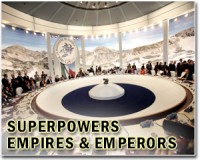| . |  |
. |
Washington (AFP) Jan 16, 2011 Ahead of a legacy-building state visit to the United States, Chinese President Hu Jintao called Sunday for "common ground" while acknowledging that "sensitive issues" needed to be addressed. Replying to questions from The Wall Street Journal and the Washington Post, Hu came out fighting on the currency issue that is so vital to the world economy, as well as to a Chinese leadership that feels it must sustain strong growth to survive. While dubbing the international currency system a "product of the past," Hu admitted it would be "a fairly long process" before China's currency, the yuan, would be a global player. Highlighting the dollar's importance to global trade, Hu implicitly criticized the Federal Reserve's recent decision to pump 600 billion dollars into the US economy, a move attacked as weakening the dollar at the expense of other countries' exports. "The monetary policy of the United States has a major impact on global liquidity and capital flows and therefore, the liquidity of the US dollar should be kept at a reasonable and stable level." On the yuan, which critics say Beijing intentionally undervalues to make its exports cheaper and gain a trade advantage, Hu suggested that arguments that allowing it to appreciate would curb inflation are too simplistic. "Changes in exchange rate are a result of multiple factors, including the balance of international payment and market supply and demand. In this sense, inflation can hardly be the main factor in determining the exchange rate policy." The Chinese leader, who is expected to step down as president and general secretary of China's Communist Party in 2012, arrives on Wednesday in Washington for his first and last state visit. President Barack Obama will welcome Hu at the White House with the full pomp of a 21-gun salute and a black-tie dinner, unlike former president George W. Bush who reserved state visits for leaders of democracies. In a wide-ranging and unusually frank speech on Friday, US Secretary of State Hillary Clinton urged China to free dissidents and improve treatment of minorities, pledging not to shy away from disagreements during the visit. There are several bones of contention between Chinese and US leaders, not least of which is the incarceration by Beijing of dissident Liu Xiaobo, Obama's successor as the Nobel Peace Prize recipient. Unsurprisingly, Hu touched neither on this nor on a host of other thorny issues that include: trade disputes, American arms sales to Taiwan, the Dalai Lama's US visit, Internet freedom, and naval rivalries in the Pacific. "There is no denying that there are some differences and sensitive issues between us," he conceded. Three days before a visit seen as an opportunity for Hu to seal his legacy as a good steward of vital US-China relations, the tenor of his message was overwhelmingly conciliatory and positive. "We both stand to gain from a sound China-US relationship, and lose from confrontation," he said. "Both sides should keep to the right direction in the development of our relations, increase exchanges, enhance mutual trust, seek common ground while reserving differences, properly manage differences and sensitive issues and jointly promote the long-term, sound and steady development of China-US relations." Aware of the diplomatic pitfalls ahead, the US and China have painstakingly prepared Hu's visit. The January 18-21 trip will include a state dinner at the White House on Wednesday evening, talks with US lawmakers and a stop in the midwestern city of Chicago. Senior officials have shuttled between the two capitals including US Defense Secretary Robert Gates, who traveled to China last week to restore military ties suspended one year ago by Beijing. Gates was meanwhile greeted by the maiden flight of China's first stealth fighter jet -- a sign of the increasingly sophisticated capability of Beijing's military. Beijing will be keen to avoid hiccups like the one during Hu's last visit to the United States in April 2006 when a member of the Falungong spiritual movement, which is banned in China, unfurled a banner on the White House lawn.
Share This Article With Planet Earth
Related Links Learn about the Superpowers of the 21st Century at SpaceWar.com Learn about nuclear weapons doctrine and defense at SpaceWar.com
 Hu's US visit not expected to bridge deep divides
Hu's US visit not expected to bridge deep dividesBeijing (AFP) Jan 16, 2011 After a tumultuous year that saw a shift in power between the world's two biggest economies, Chinese President Hu Jintao heads to Washington this week for a carefully orchestrated visit - but one that is not expected to bridge the deep divisions plaguing ties. Hu and US President Barack Obama will be at pains to put a positive spin on the complex relationship between their countries when th ... read more |
|
| The content herein, unless otherwise known to be public domain, are Copyright 1995-2010 - SpaceDaily. AFP and UPI Wire Stories are copyright Agence France-Presse and United Press International. ESA Portal Reports are copyright European Space Agency. All NASA sourced material is public domain. Additional copyrights may apply in whole or part to other bona fide parties. Advertising does not imply endorsement,agreement or approval of any opinions, statements or information provided by SpaceDaily on any Web page published or hosted by SpaceDaily. Privacy Statement |